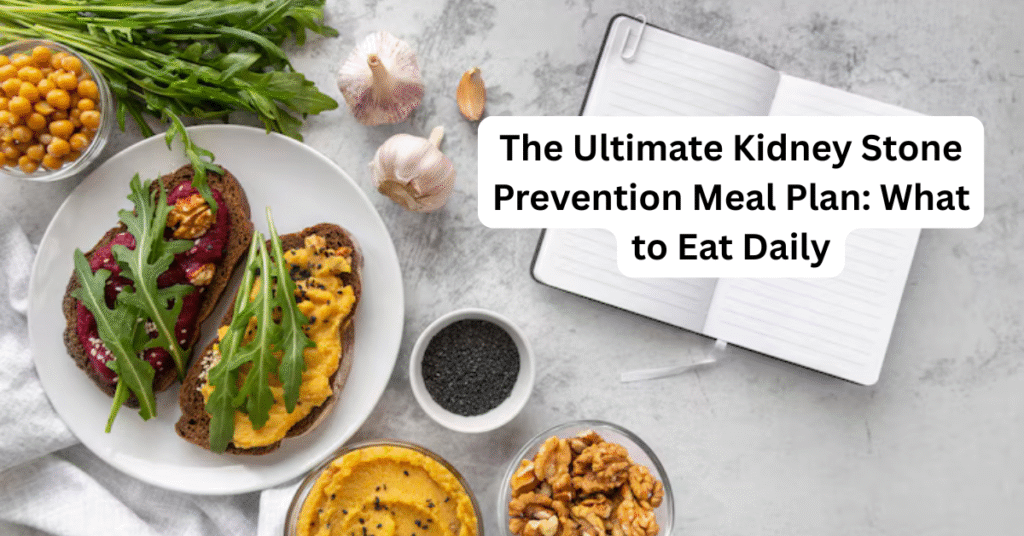Kidney stones are more than just painful—they can disrupt your daily life and, if left unmanaged, keep recurring. If you’ve experienced kidney stones before, you know how important it is to take preventive steps seriously. One of the most effective ways to reduce the risk of recurrence is through your diet. As a leading Urologist in Pune, Dr. Rakshit Ahuja emphasizes that what you eat daily plays a vital role in maintaining healthy kidneys and preventing stone formation.
This blog provides a detailed daily meal plan and dietary habits to help you stay stone-free, featuring kidney-friendly foods, ideal portion sizes, and practical lifestyle tips.
Understanding Kidney Stones and Diet
Kidney stones form when minerals like calcium, oxalate, and uric acid accumulate in the kidneys and crystallize. Dehydration, high-sodium diets, and certain medical conditions can increase your risk. While treatment options such as laser surgery and medication are available, prevention is always better—and more cost-effective.
That’s where the guidance of a Kidney Stone Treatment in Pune like Dr. Rakshit Ahuja comes in. With the right diet, you can significantly reduce your chances of future stone formation.
Daily Meal Plan for Kidney Stone Prevention
🔅 Morning Routine: Start Hydrated
6:30 AM – 7:00 AM
-
Warm water with lemon juice
Lemon is rich in citrate, which helps prevent calcium stones from forming. Avoid adding sugar.
Tip: Stay hydrated throughout the day—aim for at least 2.5 to 3 liters of water daily unless your doctor advises otherwise.
🍽️ Breakfast: Low-Oxalate & Balanced
8:00 AM – 9:00 AM
-
Oatmeal with low-fat milk (avoid almond milk if you are prone to oxalate stones)
-
Fresh fruits: Opt for bananas, apples, or papayas (avoid high-oxalate fruits like berries)
-
Boiled egg or scrambled egg whites
Portion Tip: Keep your fruit serving to 1 cup and avoid overloading with protein.
Why it works: A calcium-rich but low-oxalate breakfast can help bind oxalate in the gut, reducing stone formation risk.
☕ Mid-Morning Snack
11:00 AM – 11:30 AM
-
Coconut water or buttermilk
-
A handful of roasted chana or low-salt puffed rice
Tip: Avoid packaged juices or snacks high in sodium or preservatives.
🥗 Lunch: Balanced & Kidney-Friendly
1:00 PM – 2:00 PM
-
1-2 whole wheat rotis or 1 cup cooked brown rice
-
Low-oxalate vegetables: Lauki (bottle gourd), pumpkin, cauliflower, or cabbage
-
Dal (lentils) – in moderate quantity (½ cup)
-
Cucumber or carrot salad (without too much salt)
Portion Tip: Avoid overeating; stick to a moderate plate and limit protein intake to one serving.
Why it works: Balanced intake of complex carbs, moderate protein, and low-oxalate veggies helps maintain a healthy urinary environment.
🍵 Evening Snack
4:30 PM – 5:00 PM
-
Green tea or herbal tea (no sugar)
-
1 khakra or 2 plain digestive biscuits (low sodium)
-
A piece of fruit (e.g., apple or pear)
Avoid: Chocolates, nuts (like almonds or peanuts), and salty snacks like chips.
🍲 Dinner: Light and Hydrating
7:00 PM – 8:00 PM
-
Vegetable soup with bottle gourd, carrots, and beans
-
1-2 rotis with cooked low-salt vegetables
-
Curd or plain yogurt (rich in calcium, aids digestion)
Why it works: Light dinners reduce kidney load overnight. Including calcium-rich curd prevents oxalate stones.
💤 Before Bed Hydration
9:30 PM – 10:00 PM
-
1 glass of plain water
-
Optional: A few slices of watermelon (hydrating and low-oxalate)
Tip: Don’t skip your night-time hydration, especially if you tend to wake up with concentrated urine.
Foods to Limit or Avoid
Even with a healthy plan, it’s essential to avoid common kidney stone triggers:
-
Spinach, beets, nuts, and chocolate (high in oxalates)
-
Excessive salt – Avoid pickles, papads, and processed foods
-
Red meat and animal proteins – Increase uric acid levels
-
Colas and sodas – Contain phosphates that may promote stones
-
Calcium supplements – Use only under medical advice
Pro Tips from a Urology Doctor in Pune
Dr. Rakshit Ahuja, a renowned Urology Doctor in Pune, recommends the following dietary habits to prevent stone recurrence:
✅ Stay Hydrated: Water is your best defense against stone formation. Distribute water intake throughout the day.
✅ Don’t Eliminate Calcium: Contrary to popular belief, dietary calcium helps by binding with oxalate in the gut. Just avoid calcium supplements unless prescribed.
✅ Limit Sodium: Salt increases calcium in urine, raising your stone risk. Stick to less than 2,300 mg per day.
✅ Watch Your Protein: Too much animal protein raises uric acid and reduces urinary citrate. Opt for plant-based proteins where possible.
✅ Monitor Oxalate Intake: If you’re prone to oxalate stones, be cautious with spinach, sweet potatoes, nuts, and soy.
When to See a Kidney Specialist in Pune
If you’ve had kidney stones before or are experiencing symptoms like:
-
Severe back or side pain
-
Blood in urine
-
Burning during urination
-
Frequent urination or cloudy urine
…it’s time to consult a Kidney Specialist in Pune. Dr. Rakshit Ahuja offers comprehensive Kidney Stone Treatment in Pune, including diagnosis, lifestyle guidance, and advanced procedures like laser surgery for stone removal.
Conclusion
Eating right is the foundation of kidney stone prevention. With a strategic daily meal plan and the guidance of a trusted Urologist in Pune like Dr. Rakshit Ahuja, you can significantly reduce your risk of recurrence and protect your long-term kidney health.
Your kidneys deserve the same care as your heart or lungs. Start with what’s on your plate.
Book an appointment today with Dr. Rakshit Ahuja for expert consultation and customized dietary advice for kidney stone prevention.
📞 Call : 98905 83933
🌐 Visit Our Website: www.drrakshitahujaurologist.com


 Select an element to maximize. Press ESC to cancel.
Select an element to maximize. Press ESC to cancel.